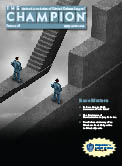June 2018

What arguments can defense counsel make when a risk assessment tool recommends that a client be detained until his trial date?
Articles in this Issue
-
Affiliate News
Affiliate News for June 2018 Champion
-
Book Review: Blue: The LAPD and the Battle to Redeem American Policing
Book review for The Champion June 2018
-
Book Review: Burning Bridges: America’s 20-Year Crusade to Deport Labor Leader Harry Bridges
Book review for The Champion June 2018
-
Book Review: Grace and Justice on Death Row: The Race Against Time and Texas to Free an Innocent Man
Book review for The Champion June 2018
-
Book Review: Race to Judgment
Book review for The Champion June 2018
-
Book Review: The Brain Defense: Murder in Manhattan and the Dawn of Neuroscience in America’s Courtr
Book review for The Champion June 2018
-
Carpenter v. United States and the Future Fourth Amendment
Carpenter v. United States set a course for rethinking Fourth Amendment rights in the digital age. The U.S. Supreme Court ruled that police must usually obtain a warrant to access historical cell site location information. The big question in Carpenter was whether the Court would continue to apply the third-party doctrine in the digital age or somehow limit its reach. Carpenter makes it clear that the Court is willing to reconsider old doctrines that do not fit with the realities of the digital age.
-
From the President: The Police Shell Game: Shedding Light on the Hiding of Bad Cops
A police officer who is fired for disciplinary reasons in one jurisdiction can be hired by a police department in another jurisdiction. A substantial part of the problem lies in the lack of uniform tracking and transparency across jurisdictions and states.
-
How Defense Attorneys Can Eliminate Racial Disparities in Criminal Justice
Nazgol Ghandnoosh presents a framework for understanding the sources of racial disparity in the criminal justice system and suggests actions that defense attorneys can take to address the problem. In addition, she identifies the mechanisms through which criminal justice policies and practices have disadvantaged people of color, and highlights efforts to reverse these trends.
-
Inside NACDL: Acclimating NACDL’s Mission to Address Racial Disparity
Through programs, policy initiatives and publications, NACDL has embraced the challenge to confront racism in the criminal justice system. These efforts are designed not only to expose the problem, but also to equip advocates who are on the front lines in the nation’s criminal courts.
-
Making Sense of Pretrial Risk Assessments
Pretrial risk assessment tools have emerged as the favored reform in the movement to lower pretrial jailing and limit the abuses of money bail. Critics have voiced concern, however, over the threat that risk assessments perpetuate racial bias inherent in the criminal justice system. When a risk assessment tool recommends that a client be detained or released with conditions — particularly a client of color — lawyers must be prepared to point out the tool’s limitations and biases.
-
NACDL News: Court Vacates Contempt Conviction Against Marine Brig. Gen. John Baker, Chief Defense Co
NACDL News The Champion June 2018
-
NACDL News: NACDL Mourns the Passing of Past President Ronald I. Meshbesher
NACDL News The Champion June 2018
-
NACDL News: Nation’s Lowest Assigned Counsel Rate: NACDL Argues for Significant Increase in Wisconsi
NACDL News The Champion June 2018
-
The Persistence of Discrimination in Jury Selection: Lessons from North Carolina and Beyond
Some state appellate courts have ignored Batson v. Kentucky. For example, in over 100 cases raising the Batson issue, appellate courts in North Carolina have never reversed a case because of discrimination against a minority juror. However, appellate courts in Washington, California, Iowa, and the District of Columbia have shown a willingness to change course. While the record will rarely contain direct evidence of purposeful discrimination, state appellate courts should consider carefully the proper application of Batson in light of the changing nature of racial bias.
-
We, the Jury: Jurors and LinkedIn
When in doubt about extraneous influence on a juror, a trial court should hold a hearing.
